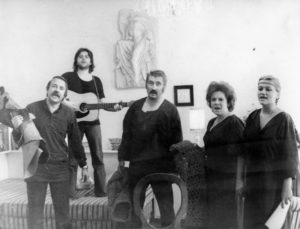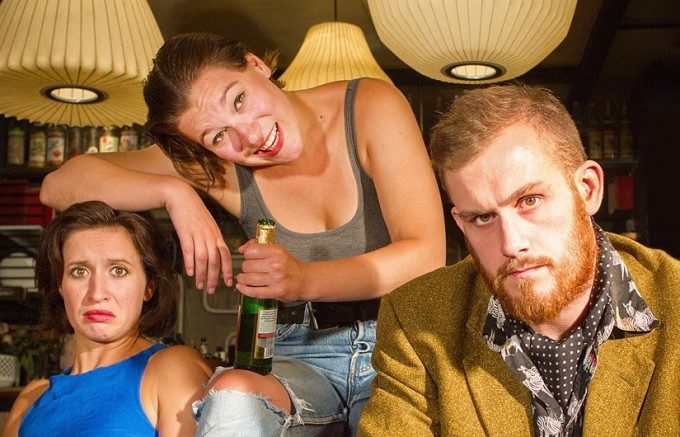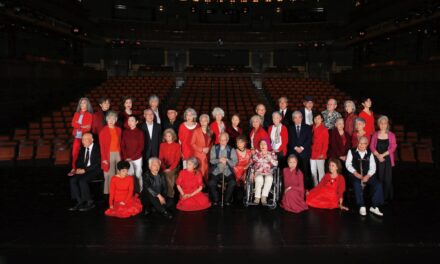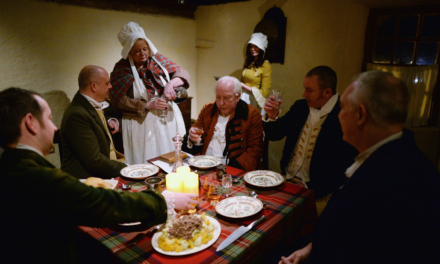With two more dates left (October 7th and November 25th) the Vanek Trilogy: Living Room Soirees–an interactive theatre production inspired by Vaclav Havel’s Vanek Trilogy– is in the middle of its exciting run across London, recreating the experience, in the communist period, of being forced to watch theatre clandestinely in people’s private homes. Audiences will buy tickets for a secret venue, the location of which will only be given a short time before.
In conversation with Renata Clark, Deputy Director of the Czech Centre in London, CEEL discussed the organizational aspects of bringing such a unique concept to life, and–in view of the current demand for the experience–the prospect of a potential second run.
In speaking about this novel idea–at least in London–of staging theatre in this way, Renata Clark says this sort of arrangement is a brand-new experience for the Czech Centre too:
“This is the first time we are actually coming to work with the local community and doing work which is theatre focused, site-specific, and immersive.”
To arrange these secret locations, the Czech Centre put out a call for participants:
“We selected four addresses…deliberately spread across London, and across the different boroughs, so that we could work with local communities and offer this particular experience to them.”
It’s a new experience for an organization based in and holding the majority of its events in central London.
“As a result of that, we’re now exploring Walthamstow, Richmond, Hoxton, and possibly Hammersmith as well–this takes us out of our comfort zone…and lets us find out other possible partners for the future–local community centers, local organizations, local clubs or drama schools, which we wouldn’t be aware of otherwise.”
I couldn’t help but ask Renata if there was an element here of using art to educate younger generations, who might not be familiar with the restrictions and censorship of this part of the region’s history, where certain texts and certain ideas were once restricted or banned altogether.

Vlasta Chramostova’s original Living Room Theatre. Image by Oldrich Skacha
“In a way, it is a political statement, but that was deliberate on our part,” replies Renata. “The idea to revive this living room theatre concept was based on the 40th anniversary of Charter 77, which is extremely important for Czech history and for the contemporary Czech Republic.”
She goes on to recall that without Charter 77 there might not have been a Velvet Revolution:
“The people who were involved in Charter 77 ended up being the people who ran the country after 1989, or at least some of them.”
The Czech Centre doesn’t shy away from any of the political implications that the Vanek Trilogy might bring to the surface.
“This is an extremely important piece of our history, which we wanted to remind other people about, and we chose living room theatre as one of the platforms for which Charter 77, as a civic movement was known for.”
Experiencing the living room theatre phenomenon is one way of coming closer to that divide which once existed between the public and the private person.
Mentioning the dissidents during communist times, Renata says that
“the private life was the only one they were allowed–they were not allowed to perform if they were actors, they were not allowed to publish books if they were writers, they were not allowed to perform music if they were musicians–so if they wanted to carry on with their artistic aspirations, and receive some sort of feedback or confrontation from the other, the only thing they could do was to do it in the intimacy of their private home–and even that obviously, was controlled and restricted. But they of course still went for it and established all these traditions of secret concerts, living room theatre, underground universities, which helped to channel their artistic expression on one side, but also helped to unify and create an alternative culture, which was very important for carrying on with the arts, as it was before 1948.”
I ask if, to some extent, this is absurdist comedy for the absurdist times we live in, and Renata offers a simple yes:
“What was behind the concept was to bring the knowledge or the tradition of living room theatre and Charter 77 to life and to let people know that something like this existed, but at the same time, we wanted to make it a contemporary experience–we didn’t only recreate life as it was in the 70s, but we brought parallels with what is happening today.”
Renata adds that the audience gets the chance to draft their own Charter, in the reflection of what Charter 77 meant to those protesting against government-abuse of human rights.
“The breach of human rights is now taking place everywhere, on every level–this is how we make the connection between past and present–it’s not just a performance of what was written by Havel in the 70s, but an adaptation to contemporary life–social media, constant surveillance, not necessarily secret police but the CCTV cameras which are everywhere, or the data that gets monitored.”
To put it simply, the goal of the Czech Centre is to make the experience of the 70s more alive and more immediate with the Vanek Trilogy–a goal, I believe, which has been perfectly achieved.
This article originally appeared in Central And Eastern European London Review on October 5th, 2017, and has been reposted with permission.
This post was written by the author in their personal capacity.The opinions expressed in this article are the author’s own and do not reflect the view of The Theatre Times, their staff or collaborators.
This post was written by Borimir Totev.
The views expressed here belong to the author and do not necessarily reflect our views and opinions.


















